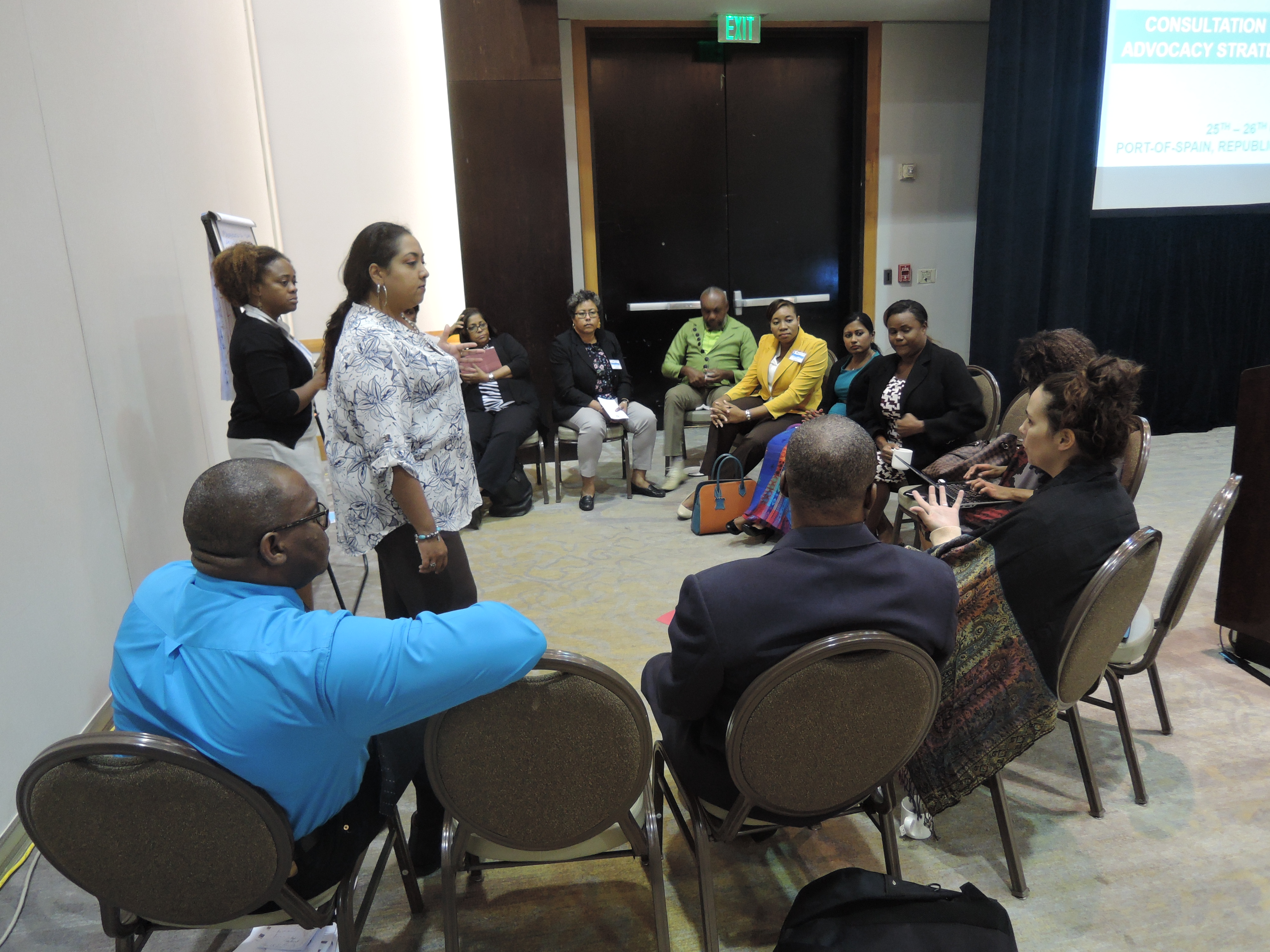
PANCAP Consultation Concludes with Priority Issues for Regional Advocacy including access to Health Care by all, Efficiency in Supply Chain Management and Inclusion of all GendersEnsuring access to treatment for migrants and persons with disabilities also seen as priorities for advocacy
The Pan Caribbean Partnership against HIV and AIDS (PANCAP), the mechanism that provides a structured and unified approach to the Caribbean’s response to the HIV epidemic, concluded the Consultation to formulate a Regional Advocacy Strategy and Five-Year Implementation Plan, held in Port-of-Spain, Republic of Trinidad and Tobago on October 25 – 26, with strategic priority areas for advocacy. These were developed by a wide cross-section of participants from the region including civil society organisations and National AIDS Programme Managers. The consultation identified core issues for advocacy including increased access to health care by People Living with HIV (PLHIV) without fear of stigma and discrimination, improving efficiency in the supply chain management through adequate forecasting and engaging with policymakers on developing anti-discrimination legislation.
Participants engaged in highly interactive discussions using the thematic areas of systems and policy reform, access to justice and redress, community, social and health services and financing and sustainability.
The consultation also noted the need to advocate for the rights of persons with disabilities to access education, prevention and treatment as well as the need for migrants to access health care services regardless of their status.
The consultation noted that access to health care by all, including PLHIV was linked directly to the Region’s ability to achieve the 90-90-90 targets. Recommendations were made to advocate for this issue at all levels including high-level advocacy with policy-makers.
The pivotal role of forecasting in supply chain management was highlighted as participants expressed concern for the need for greater efficiency through improved forecasting and joint regional negotiation for the procurement of ARVs and laboratory supplies
Participants also propagated for gender mainstreaming and addressing the rights and health requirements of transgender and other groups not usually included in dialogue.
The outcomes of the Consultation which will be reflected in the Regional Advocacy Strategy and Five-Year Implementation Plan will be disseminated to the public via the PANCAP website (www.PANCAP.org).
– ENDS –
Editor’s Notes:
Participants included NAPs from Antigua and Barbuda, The Bahamas, Barbados, Belize, Commonwealth of Dominica, Dominican Republic, Guyana, Grenada, Haiti, Jamaica, Montserrat, St Kitts and Nevis, Saint Lucia, St Vincent and the Grenadines, Suriname and Trinidad and Tobago, selected key population leaders from the Caribbean Vulnerable Communities Coalition (CVC), Caribbean Forum for Liberation and Acceptance of Genders and Sexualities (CariFLAGS), Caribbean Sex Work Coalition (CSWC) and the Caribbean Network of People Living with HIV (CRN+), Eastern Caribbean Alliance for Diversity and Equality (ECADE), Society Against Sexual Orientation Discrimination (SASOD), Coalition Advocating for Inclusion of Sexual Orientation (CAISO); Jamaica AIDS Support for Life (JASL), J-Flag/Equality for All, The University of the West Indies Rights Advocacy Project (U-RAP), United Belize Advocacy Movement (UNIBAM), the DeMarco Foundation, CARICOM Youth Ambassadors Programme (CYAP) and key population youth, faith leaders, parliamentarians, and private sector, Caribbean Med Labs Foundation (CMLF), Live Up: The Caribbean Media Alliance, AIDS Healthcare Foundation (AHF), International Organization for Migration (IOM), Johns Hopkins Knowledge for Health Project, Linkages, Pan American Health Organization/World Health Organization (PAHO/WHO), the Joint United Nations Programme on HIV/AIDS (UNAIDS), and U.S. President’s Emergency Plan for AIDS Relief-United States Agency for International Development (PEPFAR-USAID), United Nations Children’s Fund (UNICEF) and United Nations Population Fund (UNFPA).
What is PANCAP?
PANCAP is a Caribbean regional partnership of governments, regional civil society organisations, regional institutions and organisations, bilateral and multilateral agencies and contributing donor partners which was established on 14 February 2001. PANCAP provides a structured and unified approach to the Caribbean’s response to the HIV epidemic, coordinates the response through the Caribbean Regional Strategic Framework on HIV and AIDS to maximise efficient use of resources and increase impact, mobilises resources and build capacity of partners.
Contact:
Timothy Austin
Communications Specialist
PANCAP Coordinating Unit
CARICOM Secretariat
Turkeyen, Greater Georgetown, Guyana
Email: taustin.consultant@caricom.org
Tel: (592) 222-0001-75, Ext. 3409 | Visit www.PANCAP.org
WHAT IS PANCAP?
PANCAP is a Caribbean regional partnership of governments, regional civil society organisations, regional institutions and organisations, bilateral and multilateral agencies and contributing donor partners established on 14 February 2001. PANCAP provides a structured and unified approach to the Caribbean’s response to the HIV epidemic, and coordinates the response through the Caribbean Regional Strategic Framework on HIV and AIDS to maximise efficient use of resources and increase impact, mobilise resources and build the capacity of partners.
What are the Global AIDS Strategy 2021–2026 targets and commitments?
If targets and commitments in the strategy are achieved:
- The number of people who newly acquire HIV will decrease from 1.7 million in 2019 to less than 370 000 by 2025
- The number of people dying from AIDS-related illnesses will decrease from 690 000 in 2019 to less than 250 000 in 2025.
- The goal of eliminating new HIV infections among children will see the number of new HIV infections drop from 150,000 in 2019 to less than 22,000 in 2025.
What are the 95-95-95 Targets for ending AIDS?
- 95% of People Living with HIV know their HIV status;
- 95% of people who know their status on treatment; and
- 95% of people on treatment with suppressed viral loads.
HELPFUL LINKS:
Global AIDS Strategy 2021–2026, End Inequalities, End AIDS
https://pancap.org/pancap-documents/global-aids-strategy-2021-2026-end-inequalities-end-aids/
Caribbean Regional Strategic Framework on HIV and AIDS (CRSF) 2019-2025
https://pancap.org/pancap-documents/caribbean-regional-strategic-framework-2019-2025/
